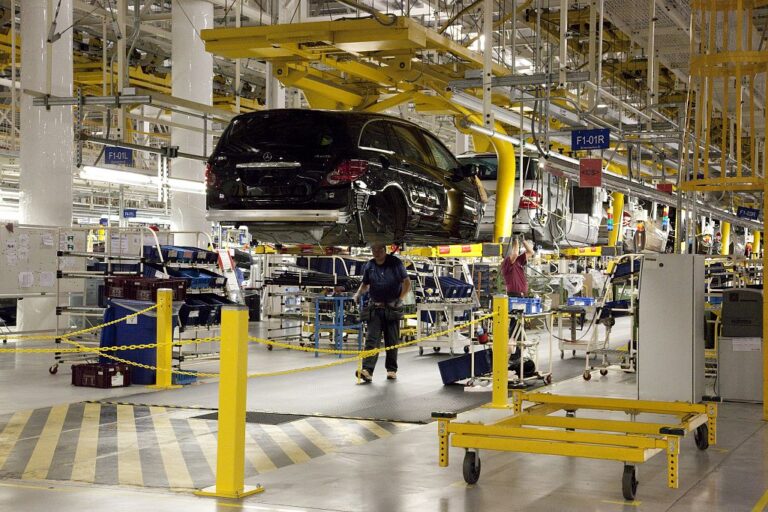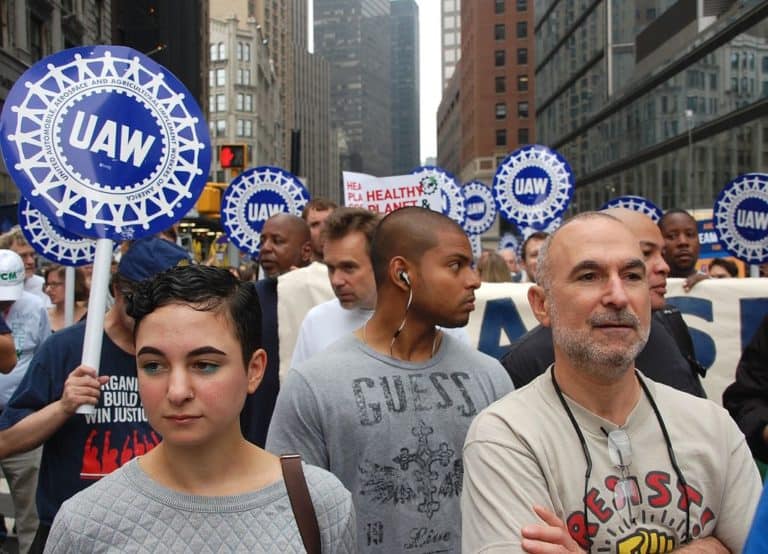
Benjamin Sachs is the Kestnbaum Professor of Labor and Industry at Harvard Law School and a leading expert in the field of labor law and labor relations. He is also faculty director of the Center for Labor and a Just Economy. Professor Sachs teaches courses in labor law, employment law, and law and social change, and his writing focuses on union organizing and unions in American politics. Prior to joining the Harvard faculty in 2008, Professor Sachs was the Joseph Goldstein Fellow at Yale Law School. From 2002-2006, he served as Assistant General Counsel of the Service Employees International Union (SEIU) in Washington, D.C. Professor Sachs graduated from Yale Law School in 1998, and served as a judicial law clerk to the Honorable Stephen Reinhardt of the United States Court of Appeals for the Ninth Circuit. His writing has appeared in the Harvard Law Review, the Yale Law Journal, the Columbia Law Review, the New York Times and elsewhere. Professor Sachs received the Yale Law School teaching award in 2007 and in 2013 received the Sacks-Freund Award for Teaching Excellence at Harvard Law School. He can be reached at [email protected].
Following the UAW’s election victory at Volkswagen in Chattanooga, TN and its defeat at Mercedes near Tuscaloosa, AL the union has shifted the focus of its organizing efforts to the Hyundai plant in Montgomery. After Hyundai, the union will continue its $40 million drive to organize non-union auto plants across the south, including those owned and operated by Tesla, Toyota, Honda, Nissan, BMW, Subaru, Mazda, and Volvo. As it does so, the UAW can expect to encounter opposition not only from many of these auto manufacturers but also from elected officials across the southern states. Elected officials are, of course, entitled to express their views on unionization. But employees are also entitled to vote in union elections that ensure a free and fair choice. Threats from public officeholders implying that unionization will lead auto plants to close or relocate interfere with that free choice. The Board should thus consider such interventions by elected officials to be objectionable conduct that, when part of a broader anti-union campaign run by the employer, can deprive workers of their right to a free and fair election.
Past is most likely prologue here. In the run-up to the Volkswagen and Mercedes elections, six governors, including Kay Ivey of Alabama and Bill Lee of Tennessee (along with the governors of Georgia, Mississippi, South Carolina, and Texas) penned a joint letter “opposing UAW’s unionization campaign.” As Andy points out, this letter would absolutely be an unfair labor practice and the grounds for setting aside an election if it had come from any of the auto manufacturers. The letter starts by expressing “concern[] about the unionization campaign” and declaring that “[a]s Governors, we have a responsibility to . . . speak up when we see special interests looking to come into our state and threaten our jobs.” The governors then explain that “companies have choices when it comes to where to invest and bring jobs” and that “[u]nionization would certainly put our states’ jobs in jeopardy.” Following the textbook anti-union playbook, the governors assert that every time the UAW organizes a “foreign automaker” the plant goes out of business and they then conclude that “[p]utting businesses in our states in that position is the last thing we want to do.”
Union elections are designed to offer employees a choice on the question of whether to form a union and bargain collectively with their employer. But, as the Board put it recently, an election “can serve its true purpose only if the surrounding conditions enable employees to register a free and untrammeled choice for or against a bargaining representative.” To ensure that employees in fact have a “free and untrammeled” choice on the union question, the Board sets rules for conduct in the pre-election campaign period, and it prohibits, among other acts, threats that unionization will lead to job loss – such threats are not only among the most common form of objectionable conduct, they are among the most powerful tool for undermining support for unionization.
Typically, when objectionable anti-union conduct occurs it is carried out by employers. But anti-union conduct carried out by third parties can also interfere with employees’ ability to make a free and untrammeled choice about unionization and the Board has thus held repeatedly that third-party conduct can be the basis of election objections. If sufficiently severe, moreover, if in the Board’s words the conduct “is so aggravated that it creates a general atmosphere of fear and reprisal rendering a free election impossible,” such third-party conduct can by itself require setting aside the results of an election.
In fact, in Richlands Textile, a case with striking similarities to the present context, the Board found an unfair labor practice (and thus by definition objectionable conduct) based on a letter sent by a North Carolina state representative one week prior to a union election. The letter read:
It is my understanding that when the vote by the employees of Richlands Textile, Inc., is taken on January 17, if they choose the Labor Union as their directors rather than the Richlands Textile, Inc., I am informed that the officials of this industry will begin to close down the operation. This to me would be a tremendous setback to our community and hundreds of people that are now employed would lose their jobs. I feel it my responsibility to point out this situation to you so that in casting your vote you will know what the end results will be. I will appreciate your giving this your serious consideration.
Because the employer did not disavow the elected official’s letter, the ALJ – in a decision affirmed by the Board – held that the letter violated the Act. The assertion by a prominent public official that unionization would lead to job loss, coupled with the employer’s failure to disavow that assertion, would reasonably create fear among the employees that a ‘yes’ vote could jeopardize their jobs. And this fear interferes with free choice.
The words of the Richlands Textile letter may differ slightly from those used in the governors’ letter opposing the UAW campaign, but the essence is the same: unionization will lead to lost jobs. And neither Mercedes, nor Hyundai, nor any of the other automakers have disavowed the governors’ letter or its implications about the impact of union organizing on jobs. As in Richlands Textile, the governors’ letter coupled with the automakers’ failure to disavow it reasonably could contribute to a fear of job loss that interferes with employee free choice.
(It is also relevant, in the current context, that several of the signatory governors have taken concrete – and likely unlawful – actions to defeat the UAW organizing drive in conjunction with their anti-union statements. The Governors of Tennessee, Georgia, and Alabama have all signed legislation – since the inception of the UAW organizing drive – that denies state economic development incentives to any employer that voluntarily recognizes a union. And while the legislation does not directly impose job losses on automakers that unionize, it may have that effect: if an automaker recognizes the UAW voluntarily, the loss of development incentives may well have serious employment effects. Moreover, given the rules of NLRA preemption, the legislation is most likely invalid. As such, the enactment of this legislation sends the message to autoworkers that the governors are prepared to back up the anti-union positions expressed in the letter with the force of state law – even if that means running afoul of federal labor protections.)
I do not claim that the governors’ letter, standing alone, is grounds for setting aside election results. For that to be true, the Board would need to determine that the letter “is so aggravated that it creates a general atmosphere of fear and reprisal rendering a free election impossible.” But the letter – and similar statements that likely will come from elected officials as the organizing drive continues – is inconsistent with untrammeled employee decision making. Such statements from public officials should thus be part of the Board’s analysis when it weighs whether an election lives up to its standards for free and fair choice.










Daily News & Commentary
Start your day with our roundup of the latest labor developments. See all
February 6
The California Supreme Court rules on an arbitration agreement, Trump administration announces new rule on civil service protections, and states modify affirmative action requirements
February 5
Minnesota schools and teachers sue to limit ICE presence near schools; labor leaders call on Newsom to protect workers from AI; UAW and Volkswagen reach a tentative agreement.
February 4
Lawsuit challenges Trump Gold Card; insurance coverage of fertility services; moratorium on layoffs for federal workers extended
February 3
In today’s news and commentary, Bloomberg reports on a drop in unionization, Starbucks challenges an NLRB ruling, and a federal judge blocks DHS termination of protections for Haitian migrants. Volatile economic conditions and a shifting political climate drove new union membership sharply lower in 2025, according to a Bloomberg Law report analyzing trends in labor […]
February 2
Amazon announces layoffs; Trump picks BLS commissioner; DOL authorizes supplemental H-2B visas.
February 1
The moratorium blocking the Trump Administration from implementing Reductions in Force (RIFs) against federal workers expires, and workers throughout the country protest to defund ICE.